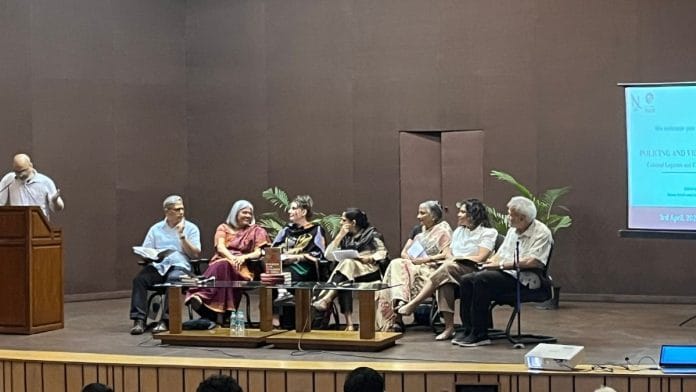New Delhi: A report by NGO Common Cause found that 55 per cent of police believe torture is an important part of their job. The force is further protected by a layer of “ancillary actors”, like doctors, who mask the real extent of the violence that is an indelible part of policing in India.
Various aspects of this entrenched, systematically enforced brutality are covered in Policing and Violence in India: Colonial Legacies and Contemporary Realities, a book of essays edited by researchers Deana Heath and Jinee Lokaneeta. The launch at Delhi’s Jawahar Bhawan comprised a panel of discussants, including contributors such as lawyer Vrinda Grover, and Sunetra Chaudhury, author of Black Warrant, which was recently turned into a Netflix series, and veteran police officer VN Rai.
Five years ago, particularly after the sexual abuse and custodial killings of father and son duo Jayaraj and Bennix in Tamil Nadu, police violence became a pressing public issue. Later that year came the CAA-NRC protests, which further intensified concerns. However, since then, in a contradictory turn of events, exigency has ebbed while popular appeal has risen manifold –– evident in the success of Netflix’s Black Warrant, which looks at Tihar Jail through a jailer’s eyes.
“If we write about these experiences and details of what people go through in custody, why does no one seem concerned?” asked Chaudhury, reiterating how deeply entrenched and structural the violence is.
The panel also dismantled tropes and stereotypes of what custodial torture looks like. It’s a malaise to which women police officers aren’t immune. Abdul Wahid Sheikh endured custodial torture for almost a decade. He was acquitted of all charges after having been accused in the 2006 Mumbai train bombings. After his release, Sheikh wrote a book titled Begunaah Qaidi ( Innocent Prisoner), published in 2019.
“There is public support for such action. People feel that if you’ve been sent to custody, it doesn’t matter if there’s evidence or not,” Chaudhury said. “You deserve that kind of treatment.”
Sheikh is now slowly going blind because of the liquid that was poured into his eyes.
Also read: India privatised Amrita Sher-Gil’s story, ignoring Hungarian roots. Delhi exhibition reclaims it
Institutional bias
According to Vrinda Grover, India has signed the UN convention against torture –– but refuses to bring in a domestic law to ratify the charter. A law was drafted during the UPA government but ultimately fell by the wayside.
“I don’t think there’s a single political party in the country that wants this law,” Grover said.
She also emphasised that the perpetrators of violence aren’t a few errant officers—a deep-seated institutional bias is at play.
“There’s a difference in thinking of the police as a reflection of something — ideology, or social hierarchies, or colonisation –– and thinking of it as a sight of something else,” said the editor of the book, Lokaneeta. “Focus needs to be brought on the police and policing as an institution with practices, techniques, and histories that need its own understanding and focus.”
VN Rai, who retired as Uttar Pradesh’s police director general, was acquainted with the system differently –– woven into its intricacies and hyper-aware of its biases and shortcomings. He’s also been a longtime advocate for police reform.
“There is an emphasis on results. Earlier, you’d obtain results for colonial masters. In a democratic police system, the focus should be on response. But that’s not the case,” he explained. “That’s why you have the glamourisation of encounters and bulldozers. Politicians are not fools –– they’re doing it because it empowers them and gives them a wider support base.”
He referred to the ties between the police and politicians as a “natural nexus”, from which there is no getting away.
Rai suggested that another agency be created, to whom matters of custody are transferred in their entirety.
Another fallibility of the system is its inadequate training modules. Issues of caste and patriarchy aren’t dwelled upon at all, pushed aside as laws rather than the structures that dictate human life. There is no design in the pipeline to amend that either.
“We have an excellent Constitution. But the Constitution doesn’t go out into the streets,” said Rai.
(Edited by Ratan Priya)







Even lady cops take part in custodial torture.